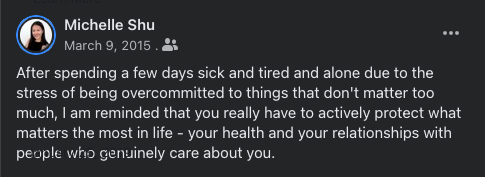If you don't prioritize your health, you'll be forced to prioritize your illness.

During my early 20s, I devoted all of my time and energy to my career. I became so wrapped up in my work that my identity and self-worth became wholly intertwined with my professional accomplishments.
I sought validation from my superiors, and I unfortunately let them dictate how I valued myself. When I played a hand in generating new revenue for the business, I celebrated as if it were my birthday. When I was promoted, I beamed with pride and satisfaction. When a project blew up for reasons out of my control, I let my headspace get flooded with worries and regrets. When a critical software issue reached production, I worked nights and weekends to resolve it. When I felt like a coworker had a leg up on me, I spent holidays sharpening my skillset instead of enjoying time with my family.

I was shaped by an environment that glorified work obsession. "You can sleep when you're dead", they said. "Go hard or go home", they said. "If you want to succeed, you have to give 110%", they said. For a long time, I bought into this mentality. After all, I was passionate about growing my career. It was the only thing gave me a sense of purpose and self-worth. I upheld my work as the most important part my life.
But then, I got sick. And that was when I began to realize that work may not be so important after all.

You have nothing without your health
The interesting thing about illness is that it strikes way harder when you're not prepared. In the most obvious sense, poor lifestyle choices such as under-sleeping, over-eating, binge drinking, and being sedentary can weaken one's immune system and create chronic, underlying health problems. Ultimately, this means that even the common cold can present more severe and long-lasting symptoms for someone who is not taking care of their body on the regular.
Another important piece of the equation is social and emotional health. Research has found that people who are socially isolated are more likely to suffer from chronic illness and have weaker immunity. Additionally, stress, depression, and anxiety all elevate stress hormones in the body, which contribute to high blood pressure, weight gain, immune suppression, and digestive issues.
Personally, I was suffering from all of the above. As I stated in my post from 2015, I was truly sick and tired and alone, all at once. It was a scary place to be. That experience forced me to confront the fact that I was sacrificing my quality of life for professional accolades. And there is no universe in which that trade is worthwhile.

When you're healthy, everything seems to matter. But when you're sick, only your health matters.
Some practical tips for prioritizing your health
It has now been over 8 years since I was on the path toward burnout and recognized the errors of my ways. After getting my wake up call, I drastically changed my habits to prioritize my well-being. Instead of gluing my eyes to a screen until the wee hours of the morning, I make sure I'm in bed by 9pm. Instead of heading directly to work after stumbling out of bed, I start my day with a 90 minute workout. Instead of ordering takeout to the office every evening, I prepare nearly all my meals myself from fresh ingredients.
You'd think that with so much practice, this new healthy lifestyle would become second nature to me. But surprise! It really hasn't. While I've developed a love for exercise, I'm only truly motivated to work out about 25% of the time. While I understand the value of good nutrition, I still crave french fries over broccoli.
Social pressure often works against health as well. It is easy to skip a workout but hard to skip a business meeting due to social expectations (even though most meetings really should be optional). When your friends and coworkers plan an outing, it's more likely to involve beer and pizza than salad bowls.

If you're working on making your health a priority and aren't sure where to start, here are just a few quick tips:
- Make small, incremental changes. No one ever succeeds when they try to turn everything around overnight. Instead of going from zero exercise to an hour-long daily workout, you might start with a 30 minute session twice per week. If you're not used to eating vegetables, try picking the least offensive type and incorporating it in a meal once a week.
- Start by improving your bedtime routine. Sleep underlies almost every aspect of physical and mental health. Improving your sleep quality is one of the most valuable changes you can make to your lifestyle. By shutting off electronics earlier and finding relaxing wind down activities, you will almost immediately reap the benefits of better energy and mood throughout the day.
- Treat your workouts like doctor's appointments. As long as you're not overcommitting, it's behooves you to start seeing your scheduled workouts as non-negotiable. Yes, life happens and emergencies arise, but pretend that rescheduling a workout is as much of a hassle as waiting on hold for half an hour just to reach your doctor's assistant for a new appointment.
- Sprinkle gentle movement throughout your day. Have 10 minutes between meetings? Take a quick walk outside. It will refresh your body and mind. And when it comes to activity, every little bit counts.
- Tell your friends and family about your goals. Social support and accountability is an enormous predictor of success when it comes to health and fitness goals. By telling someone about your goal, you commit to putting it into the world and you get someone in your corner for support when the going gets tough.


